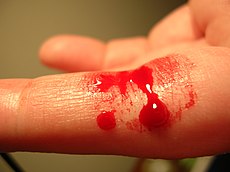Bleeding
Bleeding, technically known as haemorrhaging (Brit.) or hemorrhaging (US) is the loss of blood or blood escape from the circulatory system.[1]

Bleeding can occur internally, where blood leaks from blood vessels inside the body, or externally, either through a natural opening such as the vagina, mouth, nose, ear or anus, or through a break in the skin.
Desanguination is a major blood loss. Exsanguination is losing enough blood to cause death.[2] A person does not have to lose all of their blood to die. People can die from losing half to two-thirds of their blood.[3]
Typically, a healthy person can endure a loss of 10–15% of the total blood volume without serious medical difficulties, and blood donation typically takes 8–10% of the donor's blood volume.[4]
The World Health Organization (WHO) established a scale to measure different degrees of blood loss, from level 0 to 4. Level 0 indicates no blood loss, whilst level 4 represents the highest level of hemorrhaging, with a risk of fatality.
References
change- ↑ "Bleeding Health Article". Healthline. Archived from the original on 2011-02-10. Retrieved 2007-06-18.
{{cite web}}: More than one of|archivedate=and|archive-date=specified (help); More than one of|archiveurl=and|archive-url=specified (help) - ↑ "Dictionary Definitions of Exsanguination". Reference.com. Retrieved 2007-06-18.
- ↑ Mistovich, Joseph J.; Karren, Keith J.; Hafen, Brent (July 18, 2013). Prehospital Emergency Care (10th ed.). Prentice Hall. ISBN 978-0133369137.
- ↑ "Blood Donation Information". UK National Blood Service. Archived from the original on 2007-09-28. Retrieved 2007-06-18.
{{cite web}}: More than one of|archivedate=and|archive-date=specified (help); More than one of|archiveurl=and|archive-url=specified (help)